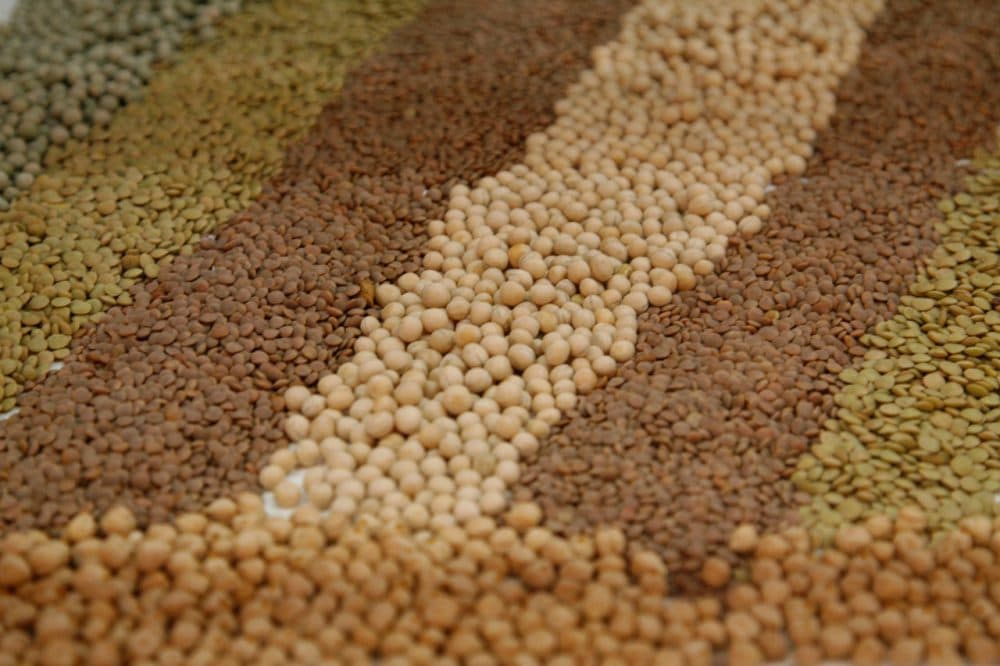Advertisement
From U.N. To New U.S. Guide, All Say Eat More Beans, Peas, Lentils — But The Gas?

Pulses are sizzling.
The United Nations has officially designated 2016 the "International Year of Pulses." Forkful.com calls pulses "one of the hottest food trends of 2016." The Crop Science Society of America suggests the Matt Damon astronaut character in "The Martian" would have done better to plant pulses than potatoes.
So what are pulses? They're basically dried seeds in the legume family, from lentils and dried peas to kidney beans and chickpeas (not fresh peas or green beans). Staples since ancient times, pulses' health benefits are so overwhelming that even the new recommended U.S. Dietary Guidelines, just out this week, mention "beans and peas" twice as part of a healthy eating pattern. Plus, they're good for the environment, enriching the soil rather than depleting it. They're cheap. And they may even help with weight loss.
Nutritionists have been praising pulses for years, so "it's great to see that recognition," says Linda Antinoro, a registered dietitian at Brigham and Women's Hospital. "They're chock full of nutrition; they're a plant-based protein, they're high in fiber, they're low in saturated fat — the fat that's not great for us — they're loaded with a variety of vitamins and minerals. They're really a powerhouse of nutrition."
So why aren't we all devouring pulses at every meal? Well, you know why. It's a little awkward to discuss.
"Probably the No. 1 reason is the fear of flatulence," says Dr. Michael Greger, founder of NutritionFacts.org and author of the new bestseller "How Not To Die." (It doesn't promise eternal life — the title refers to not dying prematurely, after a chronic, disabling illness.)

Consumption of legumes is the single best dietary predictor of how long a population lives, Greger says — from soy in Japan to brown beans in Sweden to lentils and chickpeas in the Mediterranean. "So why aren't we taking advantage of this dietary fountain of youth? Well, there's the concern about gassiness."
But there are also many possible solutions to that concern, he and others say — some culinary and some psychological.
Nothing to fear but the fear of gas itself
Greger says that when researchers tested the flatulence effect by adding a half cup of beans to people's diets, "the majority of people experienced no symptoms at all. And even among the people who do get gassy, 70 percent report it being diminished by the second week of the study. So the concerns about excessive flatulence from eating beans really may be exaggerated."
But let's say it's not exaggerated. Let's say you know your own digestive reactions, even after weeks, and your fear is well-justified. Maybe a rethink could help:
Reframing: Gas is good — or at least natural
Research shows that the average person passes gas 14 times a day, Greger notes in a NutritionFacts.org post headlined "Beans and Gas: Clearing the Air."
He writes: "Many people who think they have too much gas fall well within the normal range, concludes famed flatologist Michael Levitt, M.D., and they simply have to be informed of their ‘normality.'” (Fascinating historical note: NASA funded some research on flatulence out of concern for astronauts on long trips in confined spaces, Greger writes.)
The gas from pulses arises from a normal bacterial fermentation process, dietitian Linda Antinoro explains. "There are some natural carbohydrates in pulses, and we just don't have the enzymes in our bodies to break them down, so sometimes these undigested components get into parts of our gut and bacteria feed off them." The resulting gases emitted can cause bloating and flatulence.
"Intestinal gas is normal. It's healthy," Greger argues, though, yes, "it may have some social implications. But no less than Hippocrates wrote, 'Passing gas is necessary to well-being.' "
Fine, but let's say you don't care, you just don't want that gas. You have several options.
Pick your pulses
Dr. Greger says that lentils, split peas and canned beans tend to produce less gas than other pulses.
Cook to fight flatus
Antinoro suggests to clients at the Brigham's Nutrition Wellness Service that they give their pulses prolonged soaking, and be sure to drain away the soaking water, because the indigestible sugars leach into it. Canned beans should be very well rinsed, she says. Slow, crock pot cooking can also help. One added trick: Put an eighth of a teaspoon of baking soda into the soaking water, which can help leach out the sugars. For recipes, she recommends cookingwithpulses.com, from the USA Dry Pea And Lentil Council.
Certain spices are also known to help reduce gas, Greger says, including cloves and cinnamon. Indian cuisine uses ginger, turmeric, fennel and asafetida to ease bean digestion, writes Real Food for Life chef Diana Herrington. Her basic bean-cooking instructions are here — and if you find pulses bland, the spices could help jazz them up, too.
Start slow
Antinoro says the body needs time to adjust to the digestive challenges that pulses present. One issue that often arises with her clients, she says, is that "they hear about a food group — pulses in this case — and they say, 'I'm going on the bandwagon,' and they go from never having it to having a lot of it, and the body's like 'What's happened here?' So I think just being gradual is a great strategy. Also, eat slowly and chew thoroughly."
Over-the-counter enzymes
Greger and Antinoro both mentioned over-the-counter products that promise to cut gas by providing enzymes to aid digestion. They don't sound like a panacea, but Antinoro says she's seen them help some clients.
Greger writes: "Worse comes to worst, there are cheap supplements that contain alpha-galactosidase, an enzyme shown to break up the bean sugars and take the sail out of your wind."
Confession: All the great nutritional virtues of pulses would not have been enough to overcome my own fear of flatulence if I hadn't read that pulses can also help with weight loss. It would be a far more appealing New Year's resolution, I thought, to aim to eat more pulses rather than to resolve — one more time — to drop a few pounds.
I asked Greger about a study he just wrote about, in which eating more beans seemed to help people lose more weight and get healthier than cutting calories. Indeed, he said, people in the study "actually lost weight eating more food. They had two groups: one eating more food, adding these extra beans to the diet, and the others ate less — caloric restriction, cutting down on the quantity of the food. And it was actually more effective eating more food, adding food to the diet, because they were eating such healthy things."
So might a new year's resolution to eat more pulses make sense?
"That would be a fantastic new year's resolution!" he enthused. "It's one of the healthiest foods, and it helps you crowd out some of the less healthy options, which is basically everything else in the diet."
Readers, reactions? Do you buy it? What has worked for you when it comes to cooking and digesting pulses?
(Hat-tip to Tom Anthony)
